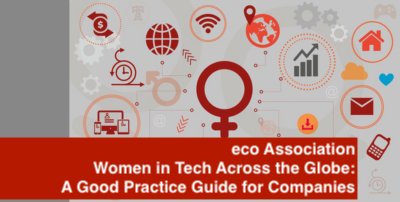- Across the globe, women represent just one quarter of tech specialists, while in Europe, just one sixth of such roles are occupied by women
- To support companies in their efforts to access the world’s greatest untapped pool of talent, the eco Association has published a study and guide “Women in Tech Across the Globe: A Good Practice Guide for Companies”
Cologne, 06.05.2020 – It’s no secret that, in the Internet industry, there are currently far less women employed as specialists than men. In the USA, for example, just a quarter of all tech specialists are women, while in countries such as Germany, France, and the Netherlands, the proportion of female specialists hovers above or below 17 percent. We might all have our views as to why this is: a male-dominated work culture, stereotypes in upbringing and education, or a lack of female role models in the industry.
One way or another, the end effect is that the gender gap is affecting the tech sector across the entire globe. As Lucia Falkenberg, Chief People Office with eco – Association of the Internet Industry, states: “For every one woman specialist working in the Internet industry, globally there are currently three men – and in Europe, there are as many as five. If we don’t move fast, age-old gender stereotypes could get bedded down in what should essentially be the most innovative and progressive of all industries.”
But luckily, for any company who may in the past have thrown up their hands and assumed that many women don’t want to work as tech specialists, there is now strong evidence of what can make a real difference in recruiting and retaining women. This is the subject of a study published today by the eco Association: “Women in Tech Across the Globe: A Good Practice Guide for Companies”. Where we currently stand in the area of gender diversity, what lies behind it, and how to get to grips with the challenges that we need to tackle now: these are the questions that eco poses and provides concrete answers to in its new international study and guide.
Gender equality is in companies’ deepest interest
There is no single tech company for whom the promotion of gender equality does not make sense, a fact which Oliver J. Süme, Chair of the Board with the eco Association, believes cannot be over-emphasized: “Companies must now make the promotion of women and diversity a top priority, because gender equality is in their deepest economic interest.” Organizations with a better gender balance not only yield greater levels of innovation and higher-than-average financial returns; they also have a far greater capacity to tap into the largest single economic force in the world: women. But increased innovation and market reach aren’t the end of the story. Ultimately, tech employers across the globe urgently need more female talent in order to address an ever-widening skills gap.
How companies can act
The study provides numerous tips for how companies can proceed, backed up not just by research findings, but also by solid experience from digital firms. One of eco’s Dutch member companies, BIT B.V., for example, found that simply changing the way they described a job more than quadrupled their numbers of women applicants. This has much to do with the fact that, in job descriptions, separating “essential” skills from those that are “nice to have” can make all the difference – given that many women are unlikely to apply for a position unless they meet 100% of the stated requirements, while men will often apply if they meet 60% of these.
Europe lagging behind compared to other regions
In some countries, the quest for gender equality needs to gain particular momentum. This fact is underlined in the eco study, which focuses particularly on a cross-sectional sample of 6 countries: Bulgaria, Germany, France, India, the Netherlands, and the USA. This comparison shows that certain European countries are well behind the curve when it comes to women in tech. For example, 34% of Indian IT specialists are women, compared to only 16.8% in Germany.
In the EU, there has actually been a backslide of 5.6% in the female proportion of the ICT specialist workforce in the past 10 years, while in the US, the percentage of women in the sector has dropped significantly in the past decades, from 36% in 1991 to the current 25.6%.
All in all, no country has reason for complacency, as no region in the world is yet coming close to reaching a 50-50 gender distribution in the Internet industry. And given the urgent need for specialists, promoting women in tech is no longer a task which can be put on hold: In 2025, for example, the labor shortage of tech workers in Germany is forecast by Empirica research to be 625,000, and 520,000 in France. Now is the time for every digital and IT company to act.
The eco study “Women in Tech Across the Globe: A Good Practice Guide for Companies” is likely to be of particular relevance to management, HR departments, and recruitment personnel within Internet companies. Whether you are a start-up, a small or medium-sized business, or a larger company or corporation – the eco study is intended for you.
You can download the management summary of the study and good practice guide here.
The complete study and good practice guide is available for download free of charge here.



